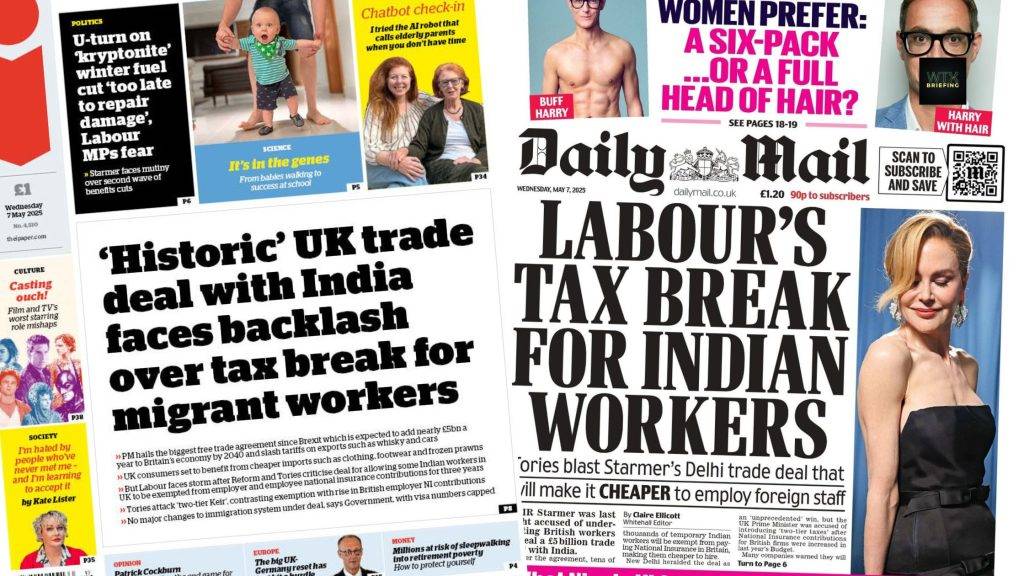Exposing the bias in the headlines
UK and India sign trade deal that will see tariffs reduced on products like whisky and gin, with expectations of a £25.5bn increase in bilateral trade. The agreement could see the UK economy be boosted by around £5bn a year – and marks the largest trade deal established by the UK since Brexit.
This major news story leads many of the UK newspaper front pages this morning, and with that, there is of course a lot of opinions being put forward as facts. Below, we’ve highlighted the bias, sensationalism and other dirty tricks being used by the media and political parties lines are drawn. It won’t come as a surprise that the right-wing papers react with anger suggesting the deal benefits Indian workers and negatively impacts UK workers (despite the fact we have similar deals with the US) it frames the UK as being a soft touch. Several of the papers lean into the ‘two-tier’ claims that have been levied against the prime minister.
The left-leaning press focuses mostly on the claims that the deal will massively boost the UK economy and is seen as a win in the face of US tariffs and uncertainty. It’s worth remembering India is the fastest-growing economy and is set to become the third-biggest economy within a few years – something the US media is noting. Several American headlines are reporting on the UK-India trade deal and noting the world is moving forward without them – as US tariffs don’t seem to be working.





Anger at Indian payoff in ‘biggest deal since Brexit‘
Explainer
Media bias: Frames the Indian deal negatively by using the word “anger,” suggesting controversy.
Sensationalism: Calls it the “biggest deal since Brexit” to provoke strong emotions and draw attention.
Tactic: Uses quotation marks to add drama while distancing the outlet from the claim.
What The Newspaper Said
The Times says the deal is the “biggest involving trade since Brexit” and will lead to a 90% fall in taxes on UK exports like whiskey and cars, the paper says. The government defended the deal, saying that it was similar to other agreements signed with the US and EU, according to the paper.
‘Two-tier‘ tax deal for Indian migrants
Explainer
Media bias: Implies unfair treatment by using “two-tier,” suggesting inequality.
Sensationalism: Highlights potential division to provoke public concern.
Tactic: Uses quotation marks to hint at controversy while maintaining plausible deniability.
What The Newspaper Said
The Daily Telegraph quotes Conservative Party leader Kemi Badenoch and Reform UK leader Nigel Farage. The paper describes the agreement as implementing a “two-tier” tax deal – because it exempts Indian migrants from National Insurance payments. Opposition leader Kemi Badenoch said she had declined to sign the deal when business secretary and added: “When Labour negotiates Britain loses.” The government said the reduction in tariffs on UK exports would be a “£4.8bn boost for British businesses”.
Labour’s tax break for Indian workers
Explainer
Media bias: Suggests preferential treatment by linking Labour to a specific ethnic group.
Sensationalism: Uses “tax break” to spark outrage over perceived unfairness.
Tactic: Frames the policy as ethnically targeted to stir political and social division.
What The Newspaper Said
The Daily Mail leads with Conservative Party criticism of the trade deal saying it will become easier and cheaper to hire Indian workers because they will be exempt from paying NI. Tories accused the prime minister of “undercutting British workers,” according to the report.
‘Historic‘ UK trade deal with India faces backlash over tax break for migrant workers
Explainer
Media bias: Highlights opposition to the deal, downplaying potential benefits.
Sensationalism: Uses “historic” and “backlash” to create drama and tension.
Tactic: Puts “historic” in quotes to question the legitimacy or exaggeration of the claim.
What The Newspaper Said
The i newspaper reports on the backlash to the trade deal citing Tories and Reform accusations that the deal will implement a “two-tier” tax system. The government says there will be “no major changes to the immigration system” under the new deal, the paper adds.
UK wins biggest post-Brexit trade deal with India
Explainer
Media bias: Positively frames the deal as a victory for the UK, aligning with pro-Brexit narratives.
Sensationalism: Uses “biggest” to exaggerate the significance and success.
Tactic: Emphasises national achievement to evoke pride and support.
What The Newspaper Said
The Independent has a more positive take on the deal suggesting that the deal is a massive boost from the “world’s fastest-growing economy” and could be worth £25.5bn.


